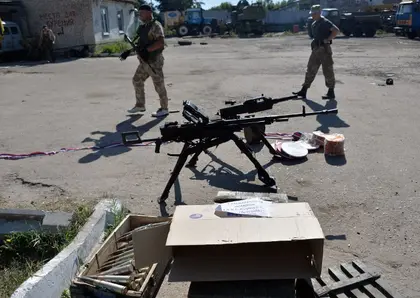Poroshenko personally came to parliament and addressed lawmakers to persuade them to vote for the laws in order to secure peace in the eastern Donetsk and Luhansk regions.
“There is no more important task for us than peace now,” Poroshenko said in his address to lawmakers as was posted on his website on Sept. 15. “These are the key points that will insure it.”
JOIN US ON TELEGRAM
Follow our coverage of the war on the @Kyivpost_official.
Both laws were passed by a majority of lawmakers during a closed session of parliament and were immediately slammed by critics as massive concessions to Russia.
“I have a nasty feeling over these laws,” Andriy Shevchenko, lawmaker of Batkivshchyna party wrote on his Twitter, claiming that process of voting was held with violation of procedure.
The first bill will impose a special order of local governance on the areas of Donetsk and Luhansk oblasts that, according to the law, will be additionally specified by parliament.
The law will come into effect on the specified territories under the rule of local governments that will be elected on Dec. 7. The state obliges to guarantee the use of Russian and other local languages in these areas. It will also subsidize the development of the territories at a special budget line.
The state also obliges to help these areas to in cross-border cooperation with bordering regions of Russia. The local authorities will be allowed to create “local militia units” for keeping of public order, the law said.
The second bill will give an amnesty to rebels acting in Donetsk and Luhansk regions since Feb. 22, except those who have committed serious crimes.
The law says the amnesty will be granted to people who “participated in armed units” and also those who “participated in self-proclaimed bodies of Donetsk and Luhansk oblasts or counteracted to anti-terrorist operation.”
The rebels will avoid criminal responsibility if they “released or are not keeping hostages,” and also gave out arms and explosives, and are not hampering the work of local governments. The decision of amnesty will be granted by court rulings, the law states.

A number of lawmakers and a majority of Batkivshchyna and Svoboda factions refused to vote for the laws that were broadly supported by presidential allies, including Vitaly Klitschko’s UDAR party and the traditionally pro-Russian Party of Regions and Communists.
Oleg Tiahnybok, Svoboda party leader, compared the adoption of today’s laws with the draconian law passed on Jan. 16 that limited public freedoms in the country. That bill led to mass streets protests in Kyiv’s center in January.
Yulia Tymoshenko, leader of Batkivshchyna, called the laws “humiliating and betraying.” Independent lawmaker Anatoly Hrytsenko said the board showing the results of vote was off at the moment when the two bills were voted so the lawmakers couldn’t see the voting process. “Things like that have never happened in (Verhkovna) Rada,” he said.
Lviv mayor Andriy Sadovy said if granted this special status “those guilty of deaths of thousands of Ukrainians” will first get more authority.
Earlier in the day, Andriy Lysenko, spokesman for Ukraine’s National Security and Defense Council, reported that Ukrainian border guards started a preliminary examination of the territory of Luhansk and Donetsk oblasts along the proposed “separation line” where a new border could be formed, according to president’s peace plan.
You can also highlight the text and press Ctrl + Enter




